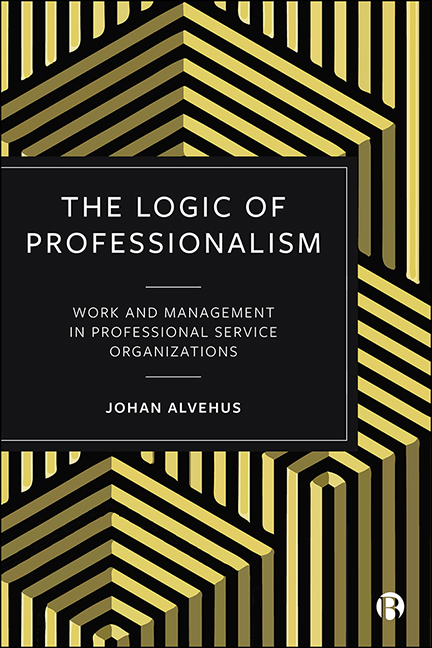Book contents
- Frontmatter
- Dedication
- Epigraph
- Contents
- About the Author
- Preface
- 1 Work in Professional Service Organizations
- 2 Professionalism from an Institutional Logics View
- 3 The Ambiguity of Professional Service Work
- 4 Control, and Control over Control
- 5 The Politics of Leadership
- 6 Superficial Hybridity
- 7 Understanding the Logic of Professionalism
- 8 The Future of Professional Work
- References
- Index
4 - Control, and Control over Control
Published online by Cambridge University Press: 30 April 2022
- Frontmatter
- Dedication
- Epigraph
- Contents
- About the Author
- Preface
- 1 Work in Professional Service Organizations
- 2 Professionalism from an Institutional Logics View
- 3 The Ambiguity of Professional Service Work
- 4 Control, and Control over Control
- 5 The Politics of Leadership
- 6 Superficial Hybridity
- 7 Understanding the Logic of Professionalism
- 8 The Future of Professional Work
- References
- Index
Summary
Looking at the previous chapter, an almost paradoxical image appears. On the one hand, we tend to think about professional work as characterized by extensive individual autonomy, based on professional judgement, client-oriented, and difficult to evaluate. It is ambiguous to outsiders and organized to deal with profession-relevant ambiguity. In such circumstances it is of course difficult to exert control over the work process. On the other hand, there is a kind of management built into the professional division of labour, and professional socialization is in itself a form of control. In addition, most professionals work in large-scale bureaucracies and these are of course subject to various forms of control and management, as large-scale operations demand coordination efforts. As organizations grow, the need for bureaucracy develops, also in knowledge-intensive contexts (Mintzberg, 1979; Kärreman et al, 2002). All in all, professional service organizations are subject to various forms of management and control, formal and informal.
In this chapter, I will draw attention to some examples of formal control mechanisms in professional service organizations. The list is far from exhaustive, but it deals with two main dimensions of control (Ouchi, 1979): control over workers (here in terms of recruitment and career development), and control over work (here in terms of time and billable hours on the one hand, and quality and work processes on the other). After an initial point regarding terminology about bureaucracy, I start by addressing recruitment and career. Here, identity is a key theme. I then move on to discuss formal control systems, first in terms of how careers tie into up-orout systems. Then, I take a closer look at the phenomenon of measuring time in terms of billable hours, and the next section also picks up on an aspect of formalization, now in terms of quality control systems and the role descriptions of work processes play. A recurring theme is how all these forms of control become transformed in organizational practice, and in the section on professional stratification I discuss the role that division of labour within a profession plays in such transformations. A fundamental insight in this chapter is how professionals often – not always – are able to take control over control systems, and with a discussion on this, the chapter closes.
- Type
- Chapter
- Information
- The Logic of ProfessionalismWork and Management in Professional Service Organizations, pp. 50 - 69Publisher: Bristol University PressPrint publication year: 2021



